|
|
by Sen. Mike Cierpiot, District 8 This is an editorial: An editorial, like news reporting, is based on objective facts, but shares an opinion. The conclusions and opinions here have been derived by the guest contributor and are not associated with the news staff.
Missouri lawmakers returned to the State Capitol on Jan. 4 for the start of the 2023 legislative session. This week, we learned our committee assignments, and I have once again been assigned chairman of the Senate’s Commerce, Consumer Protection, Energy and Environment Committee. I was also named vice chair of the General Laws Committee and was selected to serve on the Appropriations Committee and Fiscal Oversight Committee. We have a lot of work to do and hundreds of bills covering a wide-range of issues facing our state to consider this session. You can visit my Senate webpage at senate.mo.gov/Cierpiot to view all of my sponsored bills. One bill in particular I’d like to see move forward is Senate Bill 14, which modifies provisions relating to amending birth certificates. This act prohibits amending a birth certificate when the sex of an individual has been changed by non-surgical means. Additionally, no birth certificate shall be amended if the sex of the individual was changed for reasons other than a medically verifiable disorder of sex development. I don’t believe a birth certificate is a living document. You can’t change your place of birth, so why should you be able to change your gender? I am also sponsoring the following bills related to tax savings for Missourians: Senate Bill 15 modifies the Senior Citizens Property Tax Relief Credit. Current law authorizes an income tax credit for certain senior citizens and disabled veterans. Senate Bill 15 would adjust the maximum credits each year to adjust for inflation. This bill also increases income limits so more people can benefit. Senate Bill 104 reduces the assessment percentage of personal property, such as cars and boats. Current law requires personal property to be assessed at 33.3% of its true value. Beginning with the 2024 calendar year, this act would reduce the percentage by 1% a year through the 2035 calendar year. Beginning with the 2036 calendar year, personal property shall be assessed at 20% of its true value. Senate Bill 105 reduces the assessment percentage of real property. Current law requires residential real property to be assessed at 19% of market value. Beginning with the 2024 calendar year, this act lowers assessments by 1% a year through the 2026 calendar year. Beginning in 2027, the rate falls to 15%. Senate Joint Resolution 11 exempts non-commercial vehicles in excess of 10 years old from property tax. This constitutional amendment must be approved by voters. Knowing it has been challenging for many Missourians to keep up financially, I will continue fighting to reduce financial burdens for Missouri families by cutting taxes across the board and putting more money back in your pockets. Lastly, non-profit organizations, or civic, educational or cultural organizations that operate as non-profits, may receive funding for humanities-minded projects through the Missouri Humanities Council. The organization’s Major Grants program may provide grants up to $10,000 for qualifying projects. The next submission deadline is February 1, 2023. For more information, you can contact the Missouri Humanities Council at 314-781-9660. As always, I am honored to serve the citizens of the 8th Senatorial District, and I look forward to helping move our state forward. Please feel free to contact my office in Jefferson City at 573-751-1464. For information about committees or sponsored legislation for the 2023 session, please visit my official Missouri Senate website at senate.mo.gov/Cierpiot. by Rudi Keller, Missouri Independent
For the first time in its history, the only real limit on what Missouri can buy on a cash-and-carry basis is the imagination of the people spending the money. The state treasury is bulging with more than $6 billion in surplus cash, the result of 28 months of double-digit revenue growth and federal payments tied to COVID-19 relief and recovery. If growth rates continue at current levels, general revenue in the current fiscal year could approach $15 billion. Three years ago, the general revenue fund took in $8.9 billion. Some foresee a slowdown starting next year, as inflation-fighting policies slow the economy and the state sees the actual impact of recent tax cuts. Lawmakers and Gov. Mike Parson’s administration are trying to account for those uncertainties as they negotiate the budget baseline for the coming legislative session, said Sen. Lincoln Hought, R-Springfield. “It is almost kind of a wait and see game,” said Hough, who is expected to chair the Senate Appropriations Committee next year. But the large surplus promises to smooth any downturn while also allowing for new spending initiatives. The first priority should be state agencies at or near a crisis due to staff shortages and turnover, said state Rep. Peter Merideth, D-St. Louis. Merideth is the ranking Democrat on the House Budget Committee. The Independent has documented staff turnover in the Children’s Division at nearly 50%, with children in foster care missing visits with parents and rushed abuse investigations. There are hundreds of people waiting for beds in Department of Mental Health facilities due to a lack of staff. To maintain minimum staffing, the mental health department uses expensive contract professionals. To cover the cost, the department is asking for a $22 million supplemental appropriation through June 30. Those agencies need targeted spending to recruit staff, Merideth said. And state employees generally need a raise, he said. “I think we need a very large investment and an increase in investment in what our state workers are paid, especially those state workers that take care of our most vulnerable,” Merideth said. Last year, at the urging of Parson, lawmakers gave state employees the largest pay raise in decades, at least 5.5% for everyone on the state payroll, and approved a new base wage of $15 an hour for state jobs. State agencies have submitted their budget requests for the coming fiscal year, and the next step in crafting the state budget is an estimate of revenues. Jim Moody, a lobbyist and former state budget director under Republican Gov. John Ashcroft, said he expects recession and tax cuts to start slowing state revenue in the second quarter of 2023. “It is hard for me to imagine that in that quarter, it is going to keep pace with last year,” Moody said. Revenue buoyancy From 2016 to 2019, state revenues grew at a steady, if unspectacular, rate. Income tax and sales tax receipts mirrored inflation and grew about 6.5%. As profits increased, corporate income tax receipts rose at double the inflation rate. In the three years since, sales tax revenue has grown 50% faster than inflation, income tax receipts at double inflation and corporate income taxes at almost five times the inflation rate. Whether the current rush of revenue is high tide or a new base level will play out over the next couple of years. The top income tax rate will fall to 4.95% for 2023. Triggered steps in earlier cuts will reduce taxes on many businesses. Moody estimates the cumulative effect of those cuts will be to reduce revenue by about $680 million in 2023. By the time those cuts are taking hold, he said, the inflation-fighting interest rate hikes engineered by the Federal Reserve will be slowing economic growth. The economic slowdown, if one is coming, will be felt in the first half of next year, Moody predicted. “By April through June of next year,” he said, “you could have a confluence of things that turn things pretty quickly.” So far, the only noticeable impact of interest rate hikes on state government has been to increase the surplus. General revenue interest earnings, $50 million so far this fiscal year, are more than double the earnings for all of fiscal 2022. Tax receipts are rising faster than inflation through a combination of factors. Sales tax has been augmented by more revenue from internet retailers, while consumers are spending from savings and taking on large amounts of new debt. Income tax receipts reflect rising wages and investment gains. The state minimum wage, $11.15 an hour, is up 42% since 2018, or $7,000 more a year for full-time work. When the state set $15 an hour as a floor for its employees, large private employers near state facilities in central Missouri responded by boosting their starting pay. The Dollar General warehouse in Fulton, where the state operates a prison, a mental health hospital and the Missouri School for the Deaf, is now offering $20.50 an hour, up from $17 at the start of the year. The decline in revenue due to tax cuts is predictable. The impact of a recession is uncertain. In the mildest recession of the past 30 years, state revenues continued to grow. In the worst, starting in 2008, revenues declined for three consecutive years and took five more years to recover to pre-recession levels. When lawmakers met in special session to cut taxes, Hough negotiated higher thresholds for revenue growth to trigger future cuts. “We will see very quickly what kind of impact that really has,” Hough said. “The unknown is, where does this economy go?” Spending demands This year’s $49 billion state budget, passed by lawmakers in May, is the state’s largest in history. While state budgets generally grow from year to year, two items totaling more than $5 billion were new. The largest, at $2.9 billion, was a one-time appropriation of federal COVID-19 recovery funds. Much of the money will be used in local projects. Recipients for one big piece, $410 million in grants to improve local water systems, were announced Thursday. The second is the continuing expense for expanding Medicaid to cover lower-income adults from 18 to 64. The program budget was set at $2.5 billion this year, with no general revenue needed to cover the state’s 10% share. In the coming year, the Department of Social Services anticipates the cost of Medicaid expansion will increase by $373 million, again without needing general revenue for the state share. Public education gets the biggest portion of general revenue. Funding through the foundation formula, which is the main source of state support, has been stagnant for several years. But public schools got a boost they didn’t expect when lawmakers included $214 million to cover the full state obligation for student transportation. It was the first time since 1991 that the state had paid its full share. The one-time extra cash has helped but the state needs to address public education’s staffing challenge, said Melissa Randol, executive director of the Missouri School Boards Association. “We have a crisis in Missouri with our salaries impacting our teaching workforce,” Randol said. “We need more than just one-year commitments without the ability to sustain that long-term.” Missouri ranks 47th in average teacher pay and second-to-last in the nation in starting salaries at $33,234. Lawmakers also funded a program proposed by Parson to help districts boost minimum teacher pay to $38,000 and resumed state funding for the Career Ladder program, which helps districts pay more for teachers with advanced education. In its budget request for next year, the Department of Elementary and Secondary Education is seeking funds to implement some recommendations of the Teacher Recruitment and Retention Blue Ribbon Commission. The commission recommended changing state law to set the minimum at $38,000 a year, estimating the cost at $29.5 million per year. Increasing the average teacher pay by $1,000, the commission estimated, would cost $81 million. In its budget request for 2023, the department asked for the minimum pay funding but not the money to raise average salaries. The biggest new item in the education budget is $77 million for increasing foundation formula payments to charter schools under a law passed this year. The department has also asked for $233 million to continue fully funding transportation, up $19 million, and $31.8 million to expand the Career Ladder program. Hough and Merideth said they expect bipartisan support for continuing full transportation funding and for the requests stemming from the task force report. But Merideth said he’s skeptical how far lawmakers will go to put money into education or other needs. “I am not going to take for granted we have a huge surplus until we are doing the things our state needs to do,” Merideth said. And Randol said she’s waiting to see the money in a spending bill. “My grandfather said, ‘don’t tell me what your priorities are, show me your checkbook and I will know what your priorities are.’” For the first time in its history, the only real limit on what Missouri can buy on a cash-and-carry basis is the imagination of the people spending the money. The state treasury is bulging with more than $6 billion in surplus cash, the result of 28 months of double-digit revenue growth and federal payments tied to COVID-19 relief and recovery. If growth rates continue at current levels, general revenue in the current fiscal year could approach $15 billion. Three years ago, the general revenue fund took in $8.9 billion. Some foresee a slowdown starting next year, as inflation-fighting policies slow the economy and the state sees the actual impact of recent tax cuts. Lawmakers and Gov. Mike Parson’s administration are trying to account for those uncertainties as they negotiate the budget baseline for the coming legislative session, said Sen. Lincoln Hought, R-Springfield. “It is almost kind of a wait and see game,” said Hough, who is expected to chair the Senate Appropriations Committee next year. But the large surplus promises to smooth any downturn while also allowing for new spending initiatives. The first priority should be state agencies at or near a crisis due to staff shortages and turnover, said state Rep. Peter Merideth, D-St. Louis. Merideth is the ranking Democrat on the House Budget Committee. The Independent has documented staff turnover in the Children’s Division at nearly 50%, with children in foster care missing visits with parents and rushed abuse investigations. There are hundreds of people waiting for beds in Department of Mental Health facilities due to a lack of staff. To maintain minimum staffing, the mental health department uses expensive contract professionals. To cover the cost, the department is asking for a $22 million supplemental appropriation through June 30. Those agencies need targeted spending to recruit staff, Merideth said. And state employees generally need a raise, he said. “I think we need a very large investment and an increase in investment in what our state workers are paid, especially those state workers that take care of our most vulnerable,” Merideth said. Last year, at the urging of Parson, lawmakers gave state employees the largest pay raise in decades, at least 5.5% for everyone on the state payroll, and approved a new base wage of $15 an hour for state jobs. State agencies have submitted their budget requests for the coming fiscal year, and the next step in crafting the state budget is an estimate of revenues. Jim Moody, a lobbyist and former state budget director under Republican Gov. John Ashcroft, said he expects recession and tax cuts to start slowing state revenue in the second quarter of 2023. “It is hard for me to imagine that in that quarter, it is going to keep pace with last year,” Moody said. Revenue buoyancy This is an editorial: An editorial, like news reporting, is based on objective facts, but shares an opinion. The conclusions and opinions here have been derived by the guest contributor and are not associated with the news staff.
Permanent tax cuts are coming in 2023 for all hardworking Missourians. High gas prices, low stock of goods and rising costs of living have made it challenging for many people to keep up financially. With the passage of Senate Bill 3, the largest income tax cut in our state’s history, Missouri residents will soon see more money in their take-home pay. Missouri’s top individual income tax rate will lower from its current rate of 5.3% to 4.95%. This legislation also contains triggers that could lower the income tax rate further to 4.5% as Missouri’s economy grows. This will ensure that Missourians keep more of their hard-earned money while our state continues to fund essential programs. In addition, the lowest income tax bracket will be eliminated under the extra session bill. This legislation is part of a continued effort to cut taxes. As your state senator, I will continue to work to take rising inflation head-on by cutting taxes, stopping wasteful spending and putting more of your tax dollars back in your pockets. Working together, we’ve now successfully reached both goals set for this extra legislative session: cutting the state’s individual income tax rate and extending several tax credits for Missouri’s farmers and agricultural industries that put food on our tables. This $40 million tax credit package also includes incentives for ethanol and biodiesel producers and retailers, and supports urban and family farm operations, the timber industry and others. As always, I am honored to serve the citizens of the 8th Senatorial District. Please feel free to contact my office in Jefferson City at 573-751-1464. For information about legislation I have sponsored or my work in the State Capitol, please visit my official Missouri Senate website. It’s hard to believe, but the 2022 legislative session is more than halfway over. Lawmakers have managed to make some progress on several important pieces of legislation, while other issues remain to be decided.
For instance, one of my priority pieces of legislation has made it through the Senate committee process and was recently debated on the Senate floor. Senate Bill 657 establishes procedures for recall elections for school board members. Under my legislation, a recall election can be held if a recall petition is signed by at least 25% of the number of registered voters who voted in the most recent school board election. Recall proceedings would not be allowed against any member during the first 30 or last 180 days of their term or against any member who has had a recall election decided in their favor during the current term. Ultimately, this bill is about introducing some accountability into the school board system and ensuring the values of the community are always represented on these important boards. If we held municipal and school board elections during our regular elections in November when turnout is higher and better representative of the community, I believe there would be no need for a recall. Until that change is made, however, I believe allowing for a recall election is the next best thing. Senate Bill 657 has not yet been approved by the Missouri Senate, but I am committed to working on this issue further with my legislative colleagues and seeing it become law this year. Another one of my priorities was recently passed by the Senate and will soon start making its way through the Missouri House of Representatives. Senate Joint Resolution 46 is a proposed constitutional amendment, which, if approved by voters, would allow the Jackson County assessor to be elected rather than appointed. Currently, the Jackson County assessor is the only county assessor in the state that is an appointed, rather than elected, position. I hope this change will help promote accountability and consistency across the county. The Senate has also taken steps to crack down on critical race theory (CRT) from being taught in our schools. The Senate’s Education committee, which I’m a member of, recently passed several measures including Senate Bill 638, Senate Bill 645, Senate Bill 694 and Senate Bill 734 that would effectively ban CRT. I was pleased to vote “yes” on all of them. I’m eager to get these bills to the governor’s desk and get these divisive materials out of our schools. Meanwhile, the General Assembly continues to be bogged down on the issue of congressional redistricting. Recently, the Senate passed a modified version of House Bill 2117. After hearing from my constituents on the importance of a 7-1 map, I voted “no” because I believe a 7-1 map is possible, and we should strive to pass such a map. It may cause issues with communities of interest, but I’m hoping we work through that on the final map. I do have some concerns about this map surviving a court challenge. No one can predict exactly how the courts may rule, and that uncertainty and unpredictability bothers me – as it should many conservatives. If the map goes to court, it will go to the Western District Federal Court which is largely composed of Obama-era judges. Safe to say, these are not the people we want drawing our congressional districts. That said, there’s still work to be done on the map. Despite the Senate passing a version of the congressional redistricting bill, the House has rejected it and asked to go to conference to find a better solution. Unfortunately, that motion was rejected by the Senate, leaving the House in a take-it-or-leave-it situation. The House stood its ground, and requested another conference committee. It remains to be seen how this will ultimately play out. As I said before, I value a map that provides stability over the long-term and can withstand a court challenge. As we continue to work on this issue, that’s exactly what I’ll be pushing for. Capitol Visitors Over the past couple weeks, I’ve had the opportunity to meet with several student groups here in the State Capitol. On March 30, I met with Oak Grove’s AP Government and Student Council students, and the Blue Springs School District leadership team during their visit on March 31. It was great meeting these young people and area leaders and seeing them take an interest in their state government. I also had the honor of recognizing Dr. Marion Pierson during the Lt. Governor’s Women of Achievement Awards Ceremony on March 24. Dr. Pierson, a Kansas City native, founded the nonprofit MO Hives KC with a goal to place and support urban apiaries in blighted urban areas, to pollinate urban food gardens, and to provide teaching and economic opportunities for the community. The organization maintains four active hives, housing nearly a quarter of a million bees at the apiary, provides hyperlocal honey as well as offers a six-week summer program for high school and college students to learn the apiary process. I am honored to continue serving the citizens of the 8th Senatorial District. Please feel free to contact my office in Jefferson City at (573) 751-1464. For information about committees or sponsored legislation for the 2022 session, please visit my official Missouri Senate website at senate.mo.gov/Cierpiot. On Jan. 19, lawmakers from both the Missouri House of Representatives and the Missouri Senate gathered together to hear the governor deliver his State of the State address. This annual speech gives the governor the opportunity to discuss our state’s successes over the past year as well as lay out his agenda going forward.
The governor began his speech expressing confidence in Missouri’s economy. By avoiding costly shutdowns and one-size-fits-all approaches, he said Missouri has remained open for business, all while protecting lives and livelihoods. The governor noted the $5.2 billion dollars in private investment being made by businesses all across our state, which is connecting Missourians with new jobs and new opportunities. The governor pointed to the fact that unemployment currently sits at 3.5%, which is below the national average and has returned to pre-pandemic levels. Given the economic growth we’ve seen, the governor announced that Missouri’s income tax rate would decrease to 5.3% – a new low for our state. With this economic success, our state is poised to be able to make some big investments of its own. This year, the governor outlined a number of spending proposals designed to strengthen our state. For instance, he voiced continued support for several workforce development programs. He proposed permanently establishing the Missouri Fast Track program, $31 million for colleges and universities through MoExcels and $20 million for the state's 57 area career centers. These programs are meant to help “skill up” workers and ensure they are ready to meet the demands of today’s workforce. Additionally, the governor called for $400 million to go toward broadband expansion projects statewide, the single largest broadband investment in state history. This proposal would connect 75,000 households, expand access to rural areas and underserved urban areas and update and expand wireless networks across the state. As the governor said, it’s clear that “Missouri is strong today and will be even stronger tomorrow.” As the 2022 legislative session gets further underway, I’m looking forward to doing my part in helping move our state forward. I am honored to continue serving the citizens of the 8th Senatorial District. Please feel free to contact my office in Jefferson City at (573) 751-1464. For information about committees or sponsored legislation for the 2020 session, please visit my official Missouri Senate website at senate.mo.gov/Cierpiot. The 2022 Legislative Session Begins
On Jan. 5, Lawmakers returned to the State Capitol in Jefferson City for the start of the 2022 legislative session. The start of session always marks the beginning of a busy four and a half months in the Capitol, but this year seems especially busy as we prepare to take on a packed agenda. We once again have hundreds of bills to consider, covering a wide range of issues facing our state. As chairman of the Senate’s Commerce, Consumer Protection, Energy and the Environment Committee, I continue to look for ways to improve our state’s energy sector and have filed several bills that I believe will do just that this year. I’ve also sponsored Senate Bill 659, which aims to help prepare our students for the future by expanding computer science coursework throughout high schools, middle schools and elementary schools. Aside from bills I have filed, lawmakers will also be considering bills aiming to strengthen election integrity in this state, through possible photo-ID and paper ballot requirements. I also expect that we will discuss ways to build upon our success in protecting the sanctity of life in our state before session ends in Mid-May. And I’m sure the General Assembly will continue to push back against federal overreach and vaccine mandates coming out of Washington, D.C. In addition, the General Assembly will also need to pass a balanced state operating budget for the upcoming fiscal year before the end of session. Somewhat unique to this session is that lawmakers will also be undertaking congressional redistricting. This is the process of redrawing Missouri’s eight congressional districts to reflect population shifts within our state following the completion of the U.S. Census. The goal of redistricting will be to ensure all eight of Missouri’s congressional districts represent roughly the same amount of people and that Missourians are represented fairly. In the early days of session, the Senate’s Select Committee on Redistricting, which I have the honor of serving on, will handle much of this important work before sending the proposed district map to the full Senate for consideration. As you can see, we have a lot of work to complete over the next four and a half months, but I look forward to helping move our state forward. I am honored to continue serving the citizens of the 8th Senatorial District. Please feel free to contact my office in Jefferson City at (573) 751-1464. For information about committees or sponsored legislation for the 2020 session, please visit my official Missouri Senate website at senate.mo.gov/Cierpiot. In 2019, the U.S. Department of Agriculture estimated that roughly 12% of Missouri households faced food insecurity, meaning they did not have adequate food due to a lack of money or other resources at some point throughout the year. Hoping to help address this issue, the Missouri Department of Agriculture recently announced the availability of funding for projects designed to reduce food insecurity within Missouri’s urban areas.
The Food Insecure Urban Agriculture Matching Grant is a competitive grant program aiming to provide up to $50,000 per approved project. Applicants must provide a minimum 25% match for their project through a combination of cash or in-kind contributions; however, the cash match must be greater than 50% of the total match to remain eligible. Funds may be used to increase food production and availability within an urban area; demonstrate growth of local economic communities; increase local economic impact; increase availability of food to local residents; or enhance already established areas within a community and provide assistance to the community. Projects should support farmers’ markets, apiary programs, and other economic development initiatives that work to reduce food insecurity in the state’s urban areas, including Jackson, Clay, and Platte counties. Grant applications are due by Sept. 30, 2021, and projects must be completed and ready for verification by April 1, 2022. For more information regarding grant requirements and a list of eligible expenses, please visit agriculture.mo.gov/abd/financial/food-insecure.php. Individuals interested in applying for the grant can also learn more about the application process by attending an informational webinar hosted by the Department of Agriculture. The webinar will be held on September 15th at 5:00 p.m. To register and RSVP for the event, please contact Rachel Heimericks at Rachel.Heimericks@mda.mo.gov. I am honored to serve the citizens of the 8th Senatorial District. If there is anything I can do to serve you, please feel free to contact my office in Jefferson City at (573) 751-1464. For information about my committee assignments or sponsored legislation for the 2021 session, please visit my official Missouri Senate website at senate.mo.gov/Cierpiot. In 2019, the U.S. Department of Agriculture estimated that roughly 12% of Missouri households faced food insecurity, meaning they did not have adequate food due to a lack of money or other resources at some point throughout the year. Hoping to help address this issue, the Missouri Department of Agriculture recently announced the availability of funding for projects designed to reduce food insecurity within Missouri’s urban areas. The Food Insecure Urban Agriculture Matching Grant is a competitive grant program aiming to provide up to $50,000 per approved project. Applicants must provide a minimum 25% match for their project through a combination of cash or in-kind contributions; however, the cash match must be greater than 50% of the total match to remain eligible. Funds may be used to increase food production and availability within an urban area; demonstrate growth of local economic communities; increase local economic impact; increase availability of food to local residents; or enhance already established areas within a community and provide assistance to the community. Projects should support farmers’ markets, apiary programs, and other economic development initiatives that work to reduce food insecurity in the state’s urban areas, including Jackson, Clay, and Platte counties. Grant applications are due by Sept. 30, 2021, and projects must be completed and ready for verification by April 1, 2022. For more information regarding grant requirements and a list of eligible expenses, please visit agriculture.mo.gov/abd/financial/food-insecure.php. Individuals interested in applying for the grant can also learn more about the application process by attending an informational webinar hosted by the Department of Agriculture. The webinar will be held on September 15th at 5:00 p.m. To register and RSVP for the event, please contact Rachel Heimericks at Rachel.Heimericks@mda.mo.gov. I am honored to serve the citizens of the 8th Senatorial District. If there is anything I can do to serve you, please feel free to contact my office in Jefferson City at (573) 751-1464. For information about my committee assignments or sponsored legislation for the 2021 session, please visit my official Missouri Senate website at senate.mo.gov/Cierpiot. In 2019, the U.S. Department of Agriculture estimated that roughly 12% of Missouri households faced food insecurity, meaning they did not have adequate food due to a lack of money or other resources at some point throughout the year. Hoping to help address this issue, the Missouri Department of Agriculture recently announced the availability of funding for projects designed to reduce food insecurity within Missouri’s urban areas. The Food Insecure Urban Agriculture Matching Grant is a competitive grant program aiming to provide up to $50,000 per approved project. Applicants must provide a minimum 25% match for their project through a combination of cash or in-kind contributions; however, the cash match must be greater than 50% of the total match to remain eligible. Funds may be used to increase food production and availability within an urban area; demonstrate growth of local economic communities; increase local economic impact; increase availability of food to local residents; or enhance already established areas within a community and provide assistance to the community. Projects should support farmers’ markets, apiary programs, and other economic development initiatives that work to reduce food insecurity in the state’s urban areas, including Jackson, Clay, and Platte counties. Grant applications are due by Sept. 30, 2021, and projects must be completed and ready for verification by April 1, 2022. For more information regarding grant requirements and a list of eligible expenses, please visit agriculture.mo.gov/abd/financial/food-insecure.php. Individuals interested in applying for the grant can also learn more about the application process by attending an informational webinar hosted by the Department of Agriculture. The webinar will be held on September 15th at 5:00 p.m. To register and RSVP for the event, please contact Rachel Heimericks at Rachel.Heimericks@mda.mo.gov. I am honored to serve the citizens of the 8th Senatorial District. If there is anything I can do to serve you, please feel free to contact my office in Jefferson City at (573) 751-1464. For information about my committee assignments or sponsored legislation for the 2021 session, please visit my official Missouri Senate website at senate.mo.gov/Cierpiot. Celebrating 200 Years of Statehood The summer is quickly coming to an end, and the school year is right around the corner. Soon, cold weather will be here, and for many families, so too will a busy school-related schedule. So why not get out and enjoy one last fun and educational event before the summer is over?
Next week, Missourians all around the state will celebrate the state’s 200th anniversary of statehood with several special events scheduled at the State Capitol in Jefferson City. On Aug. 9, the Bicentennial Bridge will be dedicated at 2 p.m. The bridge is located just outside the Capitol, overlooking the Missouri River, and will connect pedestrians and bicyclists to Adrian’s Island when completed. Visitors can also explore the State Museum, located on the first floor of the State Capitol, which showcases both the natural and social history of the Show-Me State, as well as a Bicentennial Timeline. Tours of the Missouri Supreme Court building, which is across the street from the Capitol, can also be scheduled by calling 573-751-7331. On Aug. 10, Missouri Statehood Day formally begins with a ceremony at 9 a.m. on the front steps of the State Capitol. Later in the day, a bicentennial tree will be dedicated, and the famed Central Dairy will be providing free ice cream to the first 200 customers in line at the ice cream parlor’s parking lot trailer. The Missouri State Museum will also be open to visitors. Other exhibits on the first floor that day will feature a Bicentennial Mural painted by Missourians, a time capsule, student artwork and more. I look forward to celebrating our state’s bicentennial next week and meeting Missourians from across the state, especially from the 8th Senatorial District. All in all, I know it will be a fun and educational day for the whole family. If you’re interested in learning more about Missouri’s Bicentennial and upcoming celebrations, please visit missouri2021.org. Back-to-School Sales Tax Holiday Just as a reminder, Missouri’s annual back-to-school sales tax holiday begins at 12:01 a.m. on Friday, Aug. 6, and runs through midnight on Sunday, Aug. 8. During this time, certain back-to-school purchases such as school supplies, computers, clothing and other qualifying items as defined by statute are exempt from state sales tax. In addition to the state sales tax, local sales tax will also be waived in the cities, counties and special tax districts that choose to participate. Even if a local jurisdiction is not participating in the sales tax holiday, the state’s portion of the tax rate (4.225%) will remain exempt for qualifying purchases. For a list of cities, counties and districts that are not participating in the sales tax holiday, 2021 tax rate tables, frequently asked questions and more, please visit dor.mo.gov/taxation/business/tax-types/sales-use/holidays/back-to-school/. I am honored to serve the citizens of the 8th Senatorial District. If there is anything I can do to serve you, please feel free to contact my office in Jefferson City at (573) 751-1464. For information about my committee assignments or sponsored legislation for the 2021 session, please visit my official Missouri Senate website at senate.mo.gov/Cierpiot. Earlier this month, the governor signed legislation into law raising the state’s gas tax for the first time in over two decades. Senate Bill 262 increases the gas tax by 2.5 cents per gallon beginning in October 2021, and continues to increase it annually for five years, until reaching a total increase of 12.5 cents per gallon. This additional revenue will be used to fix and maintain roads and bridges throughout Missouri.
Now, I voted against this bill, not because it increased the gas tax, but because a similar proposal was voted down by Missourians at the ballot box in 2018. However, when you consider Missouri’s gas tax has not been increased since 1996 and realize the rising price of asphalt, steel, concrete and labor today, I think it is understandable to want to update the state’s gas tax. While I understand it’s important to maintain our roads and bridges, I also know the past year has been hard for many Missourians even without an increase in the gas tax. That is why I’m pleased to report that drivers have the opportunity to receive a refund for the additional taxes paid at the pump through a rebate provision contained in SB 262. Individuals interested in receiving a refund need to keep their gas receipts and file for a rebate with the Department of Revenue. The department is working to create the forms needed to apply for the rebate, so until they become available, I simply encourage my constituents to keep their receipts. Please note, vehicles weighing over 26,000 pounds are ineligible for the refund. All told, I’m hopeful SB 262 will help provide the resources needed to restore and improve our state’s aging infrastructure system. While no one likes tax increases, this legislation does provide interested Missourians with an avenue to recover the additional taxes paid at the pump. I am honored to serve the citizens of the 8th Senatorial District. If there is anything I can do to serve you, please feel free to contact my office in Jefferson City at (573) 751-1464. For information about my committee assignments or sponsored legislation for the 2021 session, please visit my official Missouri Senate website at senate.mo.gov/Cierpiot. Let me apologize up front for the length of this post. This past week was important and a bit complicated, and if you’ll read it to the end, you will have a much better understanding of our efforts. It is a bit in the weeds, but facts matter.
My wife and I were adults the day Roe v. Wade was decided. Connie picketed Planned Parenthood and sidewalk counseled women at 47th & Troost (the Planned Parenthood facility in Kansas City) with my support for years. We were involved with the Light House founding in Kansas City, as well as Mothers Refuge in Independence. I have always done everything in my power to advance the cause of life, both as a citizen and as an elected official. Now, the FRA, which stands for federal reimbursement allowance, is a “tax” health care providers willingly pay into an account that then is matched by the federal government at a higher rate. In total, these funds amount to more than $4 billion, which is about 40% of our Medicaid funding. Without it, our Medicaid program could not be sustained. Our Medicaid system primarily covers: Pregnant women and neonatal care up to 185% of federal poverty level. Seniors in nursing homes who have exhausted their personal savings and now rely on Medicaid funding. Individuals with developmental disabilities as in home care or day hab, which allows families to get kids and adults with disabilities the therapies and services they need to have a shot at a better life. Children Health Insurance Program (CHIPs), which provides premiums based on family income. Every part of Medicaid must comply with federal rules from the Centers for Medicaid and Medicare Services (CMS), and this is where the issue comes in. Myself and many members of my caucus support placing in the FRA a prohibition stating that “no funds shall be expended to any abortion facility as defined in section 188.015 or any affiliate or associate thereof.” As I said, I as well as other members of my caucus supported that change. However, I believe the language puts us out of compliance with CMS because there is a rule that states any willing provider that qualifies under federal law must be allowed to participate. Being out of compliance doesn’t mean we won’t prevail with the new rule, but it will need to go through a difficult process. With our current federal administration, I’m concerned there’s a reasonable chance we will be found out of compliance. I fear the administration is looking for a state to make an example of, and while I’d be happy to risk the health insurance of senators, I won’t gamble with insurance for our most vulnerable citizens. Being found out of compliance opens us up to enormous possible Medicaid penalties and clawbacks. For this reason, during debate, we also proposed adding language to the FRA bill which said that defunding Planned Parenthood would happen “at the time of either approval by the Centers of Medicaid and Medicare Services (CMS) or an administrative or judicial action requiring CMS approval.” That Medicaid protection language means our funding would be secure while the process works its way through. That is the exact language, amazingly, that some sought to strip from the bill for what they called “support” for Planned Parenthood – it’s not. It’s language that doesn’t threaten funding for neonatal care for pregnant moms on Medicaid; funding for seniors, many suffering from dementia, Alzheimer’s or other horrible terminal diseases; funding for families with developmental disabilities who just need a little help. I don’t understand how someone could consider this to be anti-life language – it’s insane. Instead of questioning the sincerity and pro-life credentials of senators who voted to keep the Medicaid protective language in the bill, I’d suggest questioning the judgment of outside groups willing to jeopardize funding for vital Medicaid services. While the effort to remove the Medicaid protection language from the bill was defeated, the provision along with the defunding language were ultimately not included in the version of the bill approved by the Senate. That said, we were able to prohibit Medicaid paid family planning services from covering “any abortifacient drug or device” used for an abortion. I believe this is an important step forward in protecting life in Missouri. Quickly, let me touch on a couple of other facts. Twenty-five years ago, Missouri averaged 20,000 surgical abortions. There have been zero this year. Zero. If you are pro-life, this is a huge win and shows the dedication of the Legislature on this issue. Let me close by summarizing this past week. No member of the Majority Caucus voted against defunding Planned Parenthood. If anyone says otherwise, they are being dishonest. After we saved the Medicaid protective language, the votes were not there to include the defund language with the protective language (I would have voted yes) in the final version of the Senate’s bill. The governor and the Legislature are working on this issue via the rule making process, as Arkansas and Texas have done. It will actually be quicker, but that wasn’t good enough for some looking for a short-term win. Missouri is just as pro-life today as it was yesterday. In fact, we have advanced the cause of life. I pray we remain that way until this issue is resolved. I am honored to serve the citizens of the 8th Senatorial District. If there is anything I can do to serve you, please feel free to contact my office in Jefferson City at (573) 751-1464. For information about my committee assignments or sponsored legislation for the 2021 session, please visit my official Missouri Senate website at senate.mo.gov/Cierpiot. |
Categories
All
Archives
April 2024
|
Grain Valley NewsGrain Valley News is a free community news source published weekly online. |
Contact Us |

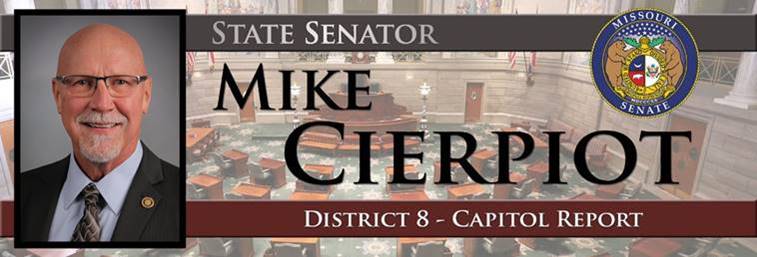


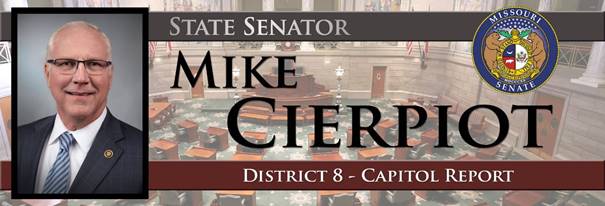

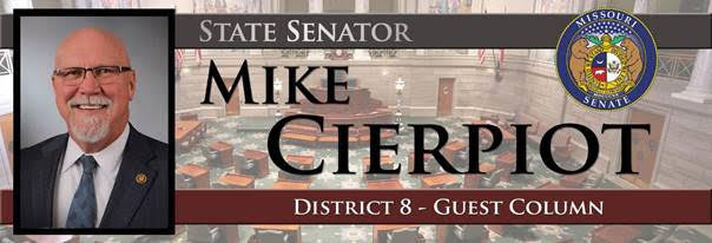
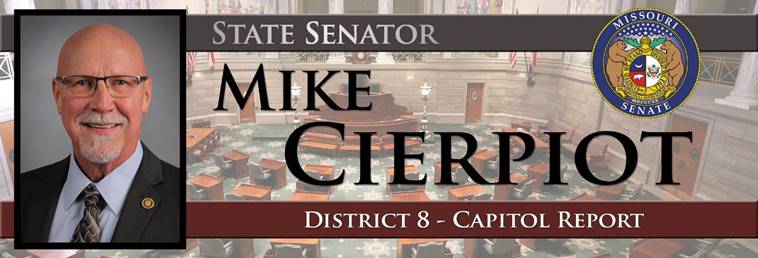
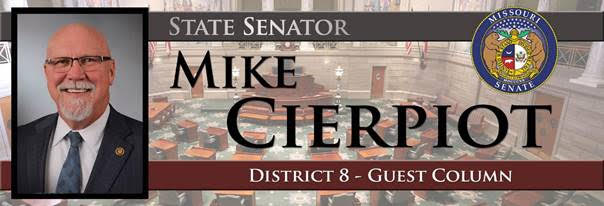

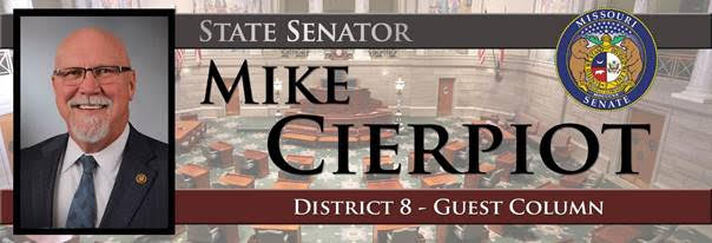


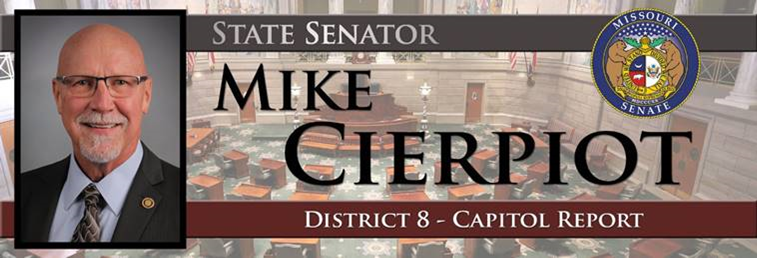

 RSS Feed
RSS Feed
